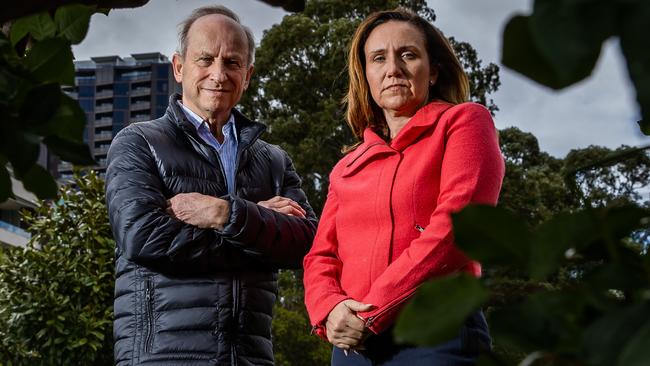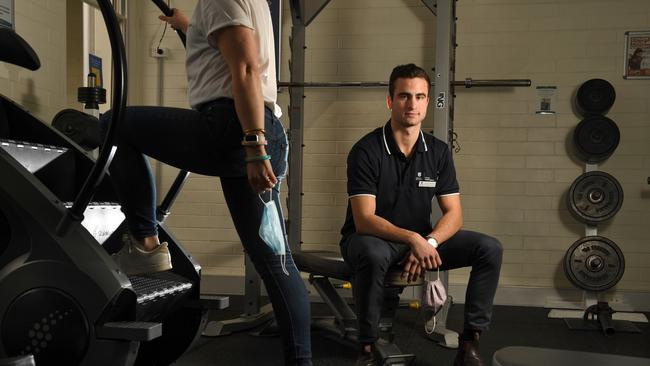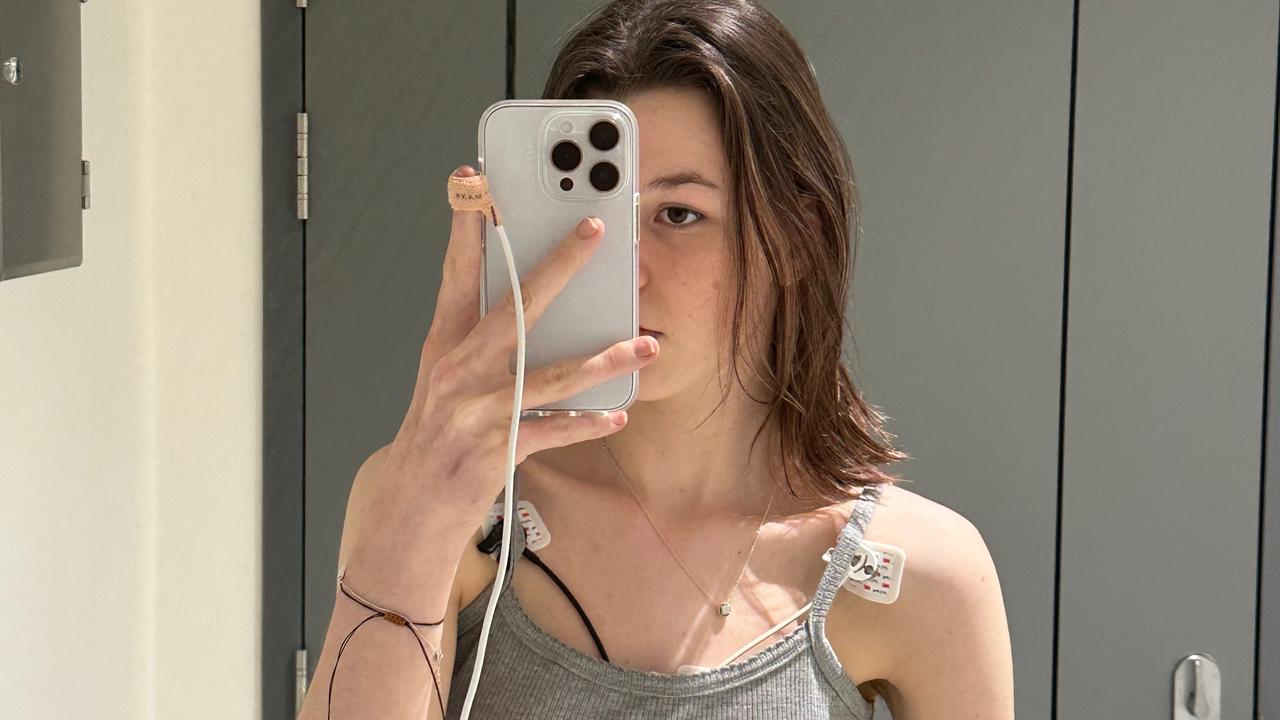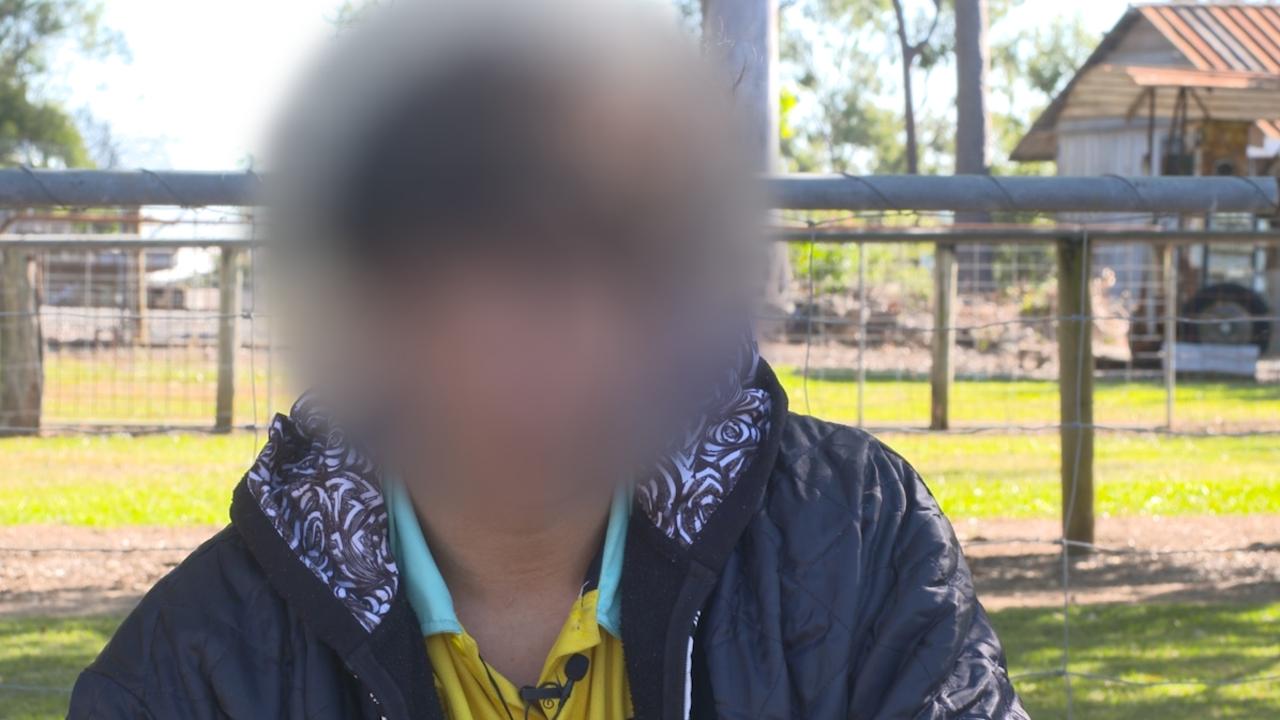Allied health workers will need to deal with ‘long Covid’ rather than hospitals
Two of the first Covid patients in SA have revealed the shocking long-term effects the virus is still having on their lives.
Coronavirus
Don't miss out on the headlines from Coronavirus. Followed categories will be added to My News.
They were ravaged by Covid-19 and, despite being fit and healthy, still battle health complications more than 18 months on.
But Anna Liptak, 47, and Paul Faraguna, 70, have a simple message – get vaccinated to avoid the horrors they have endured.
The pair’s “long Covid” issues include lung scarring, shortness of breath, exhaustion or chronic fatigue, post traumatic stress, joint pain and “brain fades”.
Mrs Liptak, a mother-of-two of Seacliff, was the state’s sixth coronavirus case in March 2020.
She had attended a Melbourne international film conference after producing a New York marathon documentary.
The fitness coach spent several days in Flinders Medical Centre with pneumonia in both lungs. While she said being jabbed is a choice, she is “frustrated” at people who are happy to have food, drink, or other substances, without any idea about what they are consuming.
“It’s really infuriating,” she said. “I trust the science. If you don’t get a vaccine why should you go to hospital and take up valuable resources.
“Don’t expect these angels – the doctors and nurses who put themselves in harm’s way – to put their life on the line.”

Mr Faraguna, a father-of-two of Rosslyn Park, was dubbed a “miracle man” after becoming South Australia’s first intensive care patient. He spent five weeks in an induced coma in the RAH but was discharged in May last year, almost three months after contracting Covid on the ill-fated Ruby Princess cruise ship.
He urged people to “not be selfish and get vaccinated for their family’s sake”.
“I think that they shouldn’t have selfish reasons,” he said.
“Because if they catch Covid severely, they should consider others, especially their close family members, who will suffer severely from seeing the suffering – and possible death – of their loved one. In many ways, the family end up suffering more.”
If you get long Covid, you’ll have to suffer at home
Another 149 hospital beds will be funded in the community to allow patients to receive treatment at home freeing up hospital beds for Covid-infected patients once restrictions ease.
The beds, which will be spread across the state and be in private homes, nursing homes and disability-supported accommodation come on top of 30 beds already announced at the Repat Health Precinct.
The 149 beds are part of a previously-announced $123m government “Covid-ready” spend the government says will deliver an extra 392 beds in the community and hospitals, freeing up bed space for Covid patients.
Premier Steven Marshall said the money would be spent on home alterations and personnel.
“We know a lot of people are currently in hospital who could do better in their own home,” he said.
“It’s a much better service for people who are currently in hospital, most people want to get out but they can’t get out unless they get the appropriate level care and the appropriate environment at home.
“There has been hospital-in-the-home services for quite some time, what we are doing now is turbo-charging so we can free up an additional 149 beds in our hospital system.”
The 432 beds are expected to be in place early next year.
It follows news as many as one in four Covid patients predicted to suffer the lingering effects dubbed “long Covid”, says the Australian Council of Deans of Health Sciences.
Long Covid can affect breathing, energy levels, hearing, sensory systems and mental health and an estimated two million people in England suffer from it.
Federal health authorities list “brain fog” as a symptom.
As South Australia prepares to open the borders by Christmas, the deans’ council chairwoman, Adelaide-based Professor Esther May, said allied health had a strong role to play.
“Providing integrated community health clinics overseen by GPs to provide rehabilitation services is absolutely vital right now as this will ensure all patients can access the quality healthcare they need to recover, while protecting emergency departments,” she said.
“The Australian focus is still firmly centred on acute hospital services and how they will cope with a massive increase in Covid infections.
“We should be looking more broadly at how all three pillars of healthcare can support each other at this time – hospitals, GPs and community allied health – and how those resources can be maximised in the face of thousands of hospital admissions each week and an increase in long-term chronic disease.

“We have thousands of people living with long-term conditions like obesity, diabetes, Parkinson’s and cancer who need ongoing care and rehabilitation services, and this will increase with the large number of Covid patients who go on to develop long Covid syndrome.”
Allied health represents around 25 per cent of the health workforce, working in areas including physiotherapy, occupational therapy, clinical exercise physiology, podiatry, dietetics, psychology and social work.
Prof May said the council wants more community settings available for students to develop real-world experience particularly in aged care, disability care, and rehabilitation, saying: “We need to rapidly increase training avenues beyond the hospital system to ensure our future allied health professionals can hit the ground running.”
Final year physio student Stefan Jankewicz from UniSA said he expects to see “much more than sports injuries in the next few years”.
“I would expect to see more cases of chronic disease in the next six months,” he said. “It could be a steep learning curve in working out the skills to manage more complex cases. Respiratory rehab is likely to be one skill in demand.
“Those working in the industry know they will need to hit the ground running.”
Symptoms of long Covid include tiredness, difficulty breathing, a persistent cough, chest pain, joint pain, not enough energy to exercise, fever, headaches, problems with memory and difficulty thinking clearly (“brain fog”) and depression or anxiety, according to the federal Health Department.




